A Quote by Joseph O'Connor
(The short story) is a form that has all the power of the novel - some would say more - but none of the self-importance.
Quote Topics
Related Quotes
A form wherein we can enjoy simultaneously what is best in both the novel and the short story form. My plan was to create a book that affords readers some of the novel's long-form pleasures but that also contains the short story's ability to capture what is so difficult about being human - the brevity of our moments, their cruel irrevocability.
The short story is at an advantage over the novel, and can claim its nearer kinship to poetry, because it must be more concentrated, can be more visionary, and is not weighed down (as the novel is bound to be) by facts, explanation, or analysis. I do not mean to say that the short story is by any means exempt from the laws of narrative: it must observe them, but on its own terms.
I am aware of the technical distinction between ‘less’ and ‘fewer’, and between ‘uninterested’ and ‘disinterested’ and ‘infer’ and ‘imply’, but none of these are of importance to me. ‘None of these are of importance,’ I wrote there, you’ll notice – the old pedantic me would have insisted on “none of them is of importance”. Well I’m glad to say I’ve outgrown that silly approach to language
I always was interested in prose. As a teenager, I published short stories. And I always wanted to write the long short story, I wanted to write a novel. Now that I have attained, shall I say, a respectable age, and have had experiences, I feel much more interested in prose, in the novel. I feel that in a novel, for example, you can get in toothbrushes and all the paraphernalia that one finds in dally life, and I find this more difficult in poetry.
We all dream dreams of unity, of purity; we all dream that there's an authoritative voice out there that will explain things, including ourselves. If it wasn't for our longing for these things, I doubt the novel or the short story would exist in its current form. I'm not going to say much more on the topic. Just remember: In dictatorships, only one person is really allowed to speak. And when I write a book or a story, I too am the only one speaking, no matter how I hide behind my characters.
Yes sir. You can be more careless, you can put more trash in [a novel] and be excused for it. In a short story that's next to the poem, almost every word has got to be almost exactly right. In the novel you can be careless but in the short story you can't. I mean by that the good short stories like Chekhov wrote. That's why I rate that second - it's because it demands a nearer absolute exactitude. You have less room to be slovenly and careless. There's less room in it for trash.





































